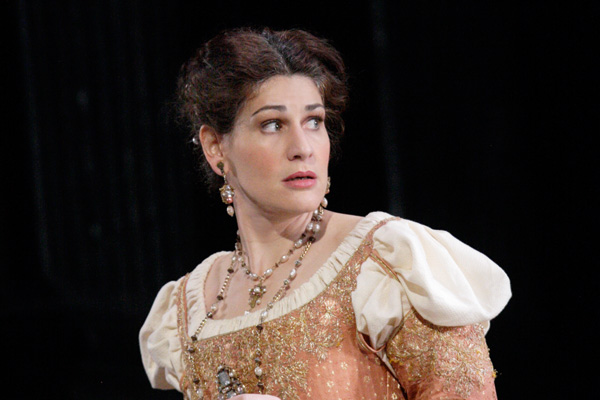Verdi’s art reaches its summit in Otello, and in doing so reveals both his greatness and a paradox that seems inseparable from it. The plot is harrowing, more so than any of his other operas, and Verdi exploits its agonising capacities to the full. The glorious love duet which concludes Act I is something to make the most of, for that is the end of happiness, as the act’s final bars suggest.
From then on it is a series of dreadful scenes in which the chief characters, deliberately or not, create as much suffering as possible — suffering which, at least at crucial points, the audience is bound to share in a satisfactory performance. Yet Verdi never forgets that he is writing for an audience which is primarily interested, as the Italians have been for the past 300 years, in performance rather than in drama, or anyway any drama except the battle between the performers and the audience; and he caters with a generosity unique even for him with a drinking song, a villain’s enthusiastic expression of his nihilism, a tormented monologue for the hero, a long sweet song for the heroine, and a rousing duet of vengeance for the hero and villain. The latter, which concludes Act II, is meant to be terrifying in the hysteria of Otello and the viciousness of Iago, but in the theatre, if adequately performed, it brings the house down and elicits cheers, gratified bows from the performers, and an exhilaration which is utterly alien to the progression of the drama. Verdi can’t have written it involuntarily, especially in view of the excruciatingly dissonant chords which bring down the curtain, so the question is raised of how serious this art is.
A question that seems to be banished by Act III, the most painful, with the duet, alternating exquisite beauty and shocking brutality, in which Otello accuses Desdemona of being a whore; the marvellously malicious scherzando section in which Otello drives himself still madder by imagining what Cassio and Iago are joking about; and the immense climax, in which, before the assembled company, Otello furiously pushes Desdemona and sings ‘A terra! e piangi!’ (To the ground! And weep!), followed by the obligatory vast ensemble of horror and revulsion. Act IV is strange. Up to that point the drama has whipped along at a furious pace, a continuous succession of what would be highlights if there were any lowlights, but now it slows to Desdemona’s ‘Willow Song’ and ‘Ave Maria’, lovely music which does nothing to characterise her or to forward the action. When that finally comes, it is even swifter than in the previous acts, and set to music reminiscent of very much earlier Verdi, apart from Otello’s great self-glorifying final solo.
How does the Royal Opera’s latest revival of Otello cope with these tensions? Largely by ignoring them, as it naturally ignores the detailed stage directions. Elijah Moshinksy’s 1987 production now appears to be directed by no one. Take an obvious piece of misdirection: in the altercation between Otello and Desdemona at the start of Act III, in this account we see Otello push Desdemona to the ground — thus pre-empting the point at which he explicitly says he’ll do it, and according to Verdi does it; here Desdemona swoons decorously and sinks to the ground under her own weakness, making nonsense of the reaction of the crowd and of the words they sing.
One has the impression that the singers are largely left to look after themselves, and being a capable team they succeed pretty well, but not well enough to lift an enjoyable evening into what Otello should and must be — a shattering one. Aleksandrs Antonenko is today’s ranking Otello, but though he has a powerful voice — his entrance was superb — he doesn’t make you suffer with him, and really, oddly, it is Otello’s suffering which is more identifiable with than Desdemona’s. Anja Harteros sings very beautifully, is perhaps too poised, but at key moments makes one wish that Desdemona would take the extremely broad hints she gets from her husband to be quiet about Cassio. Otello takes everything as indicative of something worse, though Antonenko doesn’t; Desdemona takes it that everyone goes in for total ‘transparency’, to lapse into contemporary idiom, so they are bound to collide. Iago brilliantly exploits both their weaknesses, and Lucio Gallo has the measure of the character, and never exaggerates. He and Antonio Poli, Cassio, are the native Italian speakers in the cast, and that tells. Timothy O’Brien’s monumental sets, permanent with adequate rapidly moved additions, stand the test of time well.
The orchestra, the night after Les Troyens, was on its usual excellent form. Antonio Pappano, also the night after Les Troyens, conducted with acute attention to detail, as he does, but it seemed to me that the grand sweeps of the score eluded him, most obviously in the Act III finale. I wasn’t in a state by the end, and I had hoped I would be — that is what one goes to Otello for.






Comments